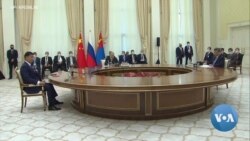China and Russia’s level of cooperation on display in Uzbekistan.
Welcome to VOA Asia Weekly. I'm Chris Casquejo in Washington. That story is coming up, but first, making headlines.
North Korea unveiled new propaganda posters featuring its nuclear-tipped ballistic missiles for the first time in years, state media reported, after leader Kim Jong Un enshrined pre-emptive strike into its nuclear policy last week.
Hundreds of conservative Muslims marched in Indonesia’s capital demanding that the government revoke its decision to increase fuel prices.
Bangladesh's prime minister Sheikh Hasina said that the prolonged stay of more than 1 million Rohingya refugees in crowded camps has become a serious security and stability concern. She made the comments during a three-day meeting of military officials from 24 countries in the Indo-Pacific region.
The chief of the U.S. Agency for International Development announced a $60 million dollar aid package for Sri Lanka, with $40 million for fertilizer imports and $20 million for humanitarian needs to help the country's deep financial crisis.
The new session of the United Nations General Assembly has opened with a warning from its new president, Hungary’s Csaba Korosi, that protracted global uncertainties, inflation and conflicts are creating upheavals not seen since the Second World War.
As Russia faces further isolation from the West after its invasion of Ukraine, Russian President Vladimir Putin and Chinese leader Xi Jinping met in Uzbekistan, a gathering that indicates the strength of the cooperation between the two countries. Marcus Harton narrates this report from the VOA Moscow Bureau.
Russia has looked to China for relief from international sanctions and wants to strengthen its ties with Beijing.
But it’s an unequal relationship. Some analysts say China sees Russia as a political partner, not an economic one.
“What is the volume of trade between Russia and China? This is the best partner of Russia, isn't it? 143 billion [US] dollars! What is the volume of trade between China and the United States? They are adversaries, but it is 700 billion.”
Russia may not be China's largest trading partner, but Beijing now represents Moscow's largest political partner.
"In terms of geopolitical affairs, Russia and China share similar views on the West and the Asia-Pacific region."
They also both have an adversarial relationship with the United States.
“Russia and China have got an important common opponent: the United States of America, whose relations with Russia are completely spoiled and are consistently deteriorating with China. That naturally makes Russia and China closer to each other.”
This is the Chinese leader's first trip outside his country since the start of the COVID crisis, and the decision to hold the meeting in Uzbekistan highlights the area’s strategic importance.
“Central Asia is also a transit region. This is the first point. Secondly, there are China's real economic interests. That is quite clear. But you know, I would say that the Chinese are a sort of ‘philosophers of politics.’ They perfectly realize anyway that Central Asia will never escape their influence.”
With Russia isolated from the West, and China striking a difficult balance between politics and business, Moscow hopes to use the meeting between Putin and Xi to strengthen the only remaining bridge it has since its decision to attack Ukraine.
For the VOA Moscow Bureau, Marcus Harton, VOA News.
Visit voanews.com for the most up-to-date stories. You’re watching VOA Asia Weekly.
Finally, a U.S. Senate committee moved forward legislation that would significantly enhance U.S. military support for Taiwan. The Taiwan Policy Act would provide more than $4 billion dollars in additional security assistance. It also calls for treating Taiwan as a major non-NATO ally.
The next step, a vote in the full Senate. But no word on when that might take place.
That’s all the time we have here on this edition of VOA Asia Weekly.
Thank you so much for joining us. I’m Chris Casquejo. Please be sure to tune in again next week.












